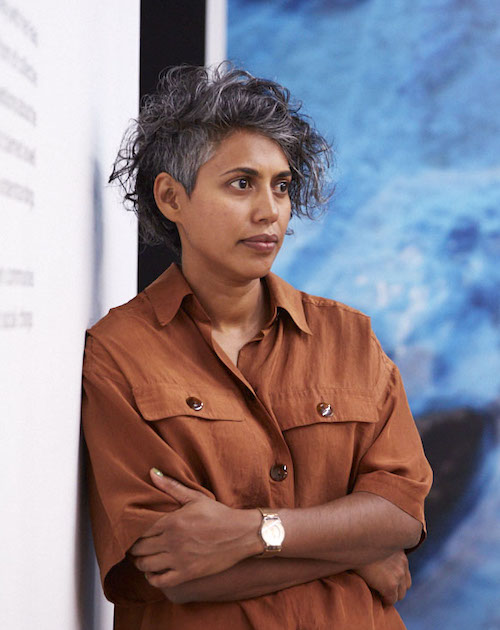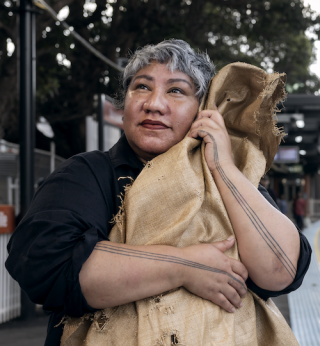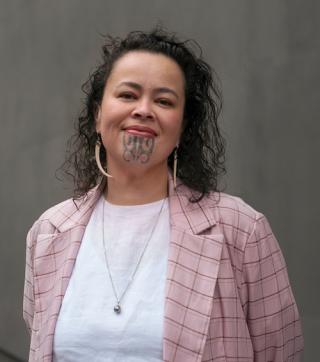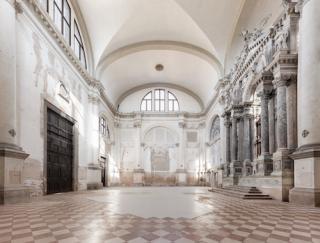If you enter at just the right time, you can see the sunlight refracting through the glass windows of the spacious sixteenth-century church, creating an underwater-like atmosphere. This is Ocean Space, a centre for oceanic imagination in Venice that presents exhibitions and public programs promoting critical Ocean literacy, collaborative research, and environmental advocacy through the arts. Founded and led by TBA21–Academy, the research arm of the international art and advocacy foundation TBA21, this cultural ecosystem 'inhabits' the church of San Lorenzo in the Castello district. After two years of restoration and more than a hundred years of being closed to the public, the church of San Lorenzo opened its doors in 2019 as Ocean Space.

Taloi Havini
At TBA21–Academy, we perceive the Ocean as one body of water that connects various aquatic ecosystems – including the Venetian Lagoon. Since 2019, when the space opened with Joan Jonas' Moving Off the Land II, a poignant tribute to theOcean and its delicate ecologies, our programme has continuously striven to look at nature from a perspective that does not necessarily centre the human. This year's exhibition continues to challenge anthropocentric views with Re-Stor(y)ing Oceania, an exhibition curated by Taloi Havini, the Bougainville-born artist who returns to Ocean Space as a curator after her solo exhibition in 2021. Taloi's practice favours a ‘sea to land’ rather than ‘land to sea’ point of view, presenting two site-specific commissions by Indigenous artists from the Pacific, Latai Taumoepeau and Elisapeta Hinemoa Heta, on view at Ocean Space from 23 March. The exhibition project has been commissioned by TBA21–Academy and Artspace, Sydney, and produced in collaboration with Turin's OGR, a hub of innovation and art.

Latai Taumoepeau
Re-Stor(y)ing Oceania presents a dialogue of performance, sculpture, poetry, and movement between the work Deep Communion sung in minor (archipelaGO, THIS IS NOT A DRILL) by the artist Latai Taumoepeau and The Body of Wainuiātea by Elisapeta Heta. An inhabitant of Tonga, the only Pacific island that has not been colonised, Latai Taumopeau's practice is characterised by the use of performance that embodies a language of resistance. Through her participatory sculptural installation, the artist creates a choral work that will engage the audience in connecting with Pacific Islanders and learning more about the threat of deep-sea mining, an issue TBA21–Academy has engaged with for nearly a decade.

Elisapeta Heta
In conjunction with Taumoepeau's new solo commission, a live project space imagined by Elisapeta Heta, a Māori, Samoan, and Tokelauan leader and promoter of change, will be set up. Her work offers Māori and Pasifika perspectives on the importance of place to design and cultural identity. The multidisciplinary space, designed to re-establish a network of solidarity through the practice of ritual, will see conversations, performances, and other encounters with various actors on the cultural scene, including three days of live performances during the week of the Venice Biennale's vernissage (April 16–20, 2024).
Ocean Space's programme is focused on fostering a deeper connection with the natural world through the lens of contemporary art and through transdisciplinary encounters. That history can be traced from the aforementioned inaugural exhibition by Joan Jonas across exhibitions staged as part of The Current, TBA21–Academy's fellowship programme that cultivates the exchange of ideas around the Ocean and its understanding. Each cycle of The Current is led by a curatorial fellow who nominates other practitioners to join a collective research project unfolding over three years. This year, the exhibition at Ocean Space will be accompanied by Climate Crisis and Cultural Loss (2021–2024), a three-year research inquiry led by Prof. Ute Meta Bauer and housed by the School of Art, Design, and Media at Nanyang Technological University Singapore. This inquiry responds to the very first cycle of The Current (2015–2018) led by Bauer, revisiting connections and conversations seeded during research trips to Papua New Guinea, French Polynesia, and Fiji to further explore archipelagic networks across the Alliance of Small Island States. The presented research echoes the concerns of Re-Stor(y)ing Oceania and thus interweaves the storylines of past and present journeys with TBA21–Academy.

This commitment to the tentacular is at the core of our program at Ocean Space. Through deep collaborations with artists such as Territorial Agency (2020–21), Dineo Seshee Bopape and Diana Policarpo (2022), Simone Fattal, Álvaro Urbano, and Petrit Halilaj (2023), and curators such as Daniela Zyman, Stefanie Hessler, Ute Meta Bauer, Chus Martínez, and Barbara Casavecchia, our shared endeavours aim to challenge the separation of nature and culture and evoke new possibilities of relational, common, and multispecies futures.
